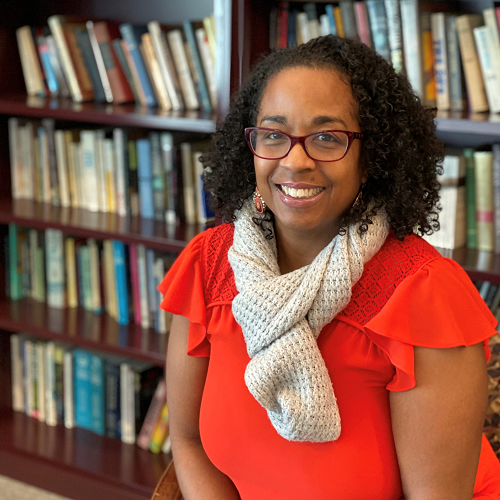
Nina Gibson, M.A. ’20 is a M.A. candidate with an emphasis in Creative Writing. She took a 30-year hiatus from school, and is now back to pursue novel writing.
Q: What brought you to LMU?
A: A strong desire to complete my first novel and further my education are what brought me to LMU. I would have been happy with a bachelor’s degree, but I knew my writing still needed some fine-tuning and focus. I was working on too many projects at once. My time at LMU uncovered a love of researching history I didn’t know I had and a genre I never considered was brought into focus–the historical fiction novel.
Q: What are some academic highlights you’ve had thus far during your time at LMU?
A: Winning two scholarships through the department and watching my writing improve to the point where I was encouraged to submit my work are two academic highlights making a huge impact on my future. I have waited 40 years to feel this confident about my work and I am thrilled to be wrapping up my first draft of my novel knowing I have the talent and the skill-set to make it a success.
Q: What are your future academic or professional plans?
A: Academically, I am still considering teaching. I would love to go to Japan for a year where I have family in Okinawa and work with my niece on a book about her experience growing up black and Japanese in an all Japanese school. Professionally, I hope to spend the summer promoting my novel, “We Were Once Here & Then We Were Gone,” the story of a friendship between a Japanese man fresh from WWII and Manzanar and a black woman who migrated with thousands of others from the South seeking work and space to breathe and thrive outside Jim Crow laws in Little Tokyo, which became Bronzeville once the Japanese were interned.
Q: What does your creative writing process look like?
A: During the week when coursework takes precedent, I find I have an hour of writing along with an hour of research, but on the weekends, I nix the research and focus on writing until I can’t type any further. I am happy if I get in two-three hours on Saturday and Sunday and over the moon when I can do more. Even before LMU, that was my process. I have found that Prof. Ryan’s Critical Methodology course greatly strengthened my research skills and has allowed me to write more effectively the first time around.
Q: What authors inspire your work? What is a favorite book of yours?
A: Wow, that’s tough. I love so many. Richard Wright, Edwidge Danticat, Colson Whitehead and after reading “The Tattooist of Auschwitz” by Heather Morris and “Hotel on the Corner of Bitter and Sweet” by Jamie Ford, I will most likely read everything they write.
Q: Do you have any advice for incoming graduate students?
I would advise incoming graduate students to be open to feedback—I mean on everything—from your academic papers to your creative writing work. Embrace the positive, but really dive into the challenges of your work. Is it grammar (my Achilles heel)? Or is it sentence structure, or transitions, or do your ideas lack excitement? The world of Little Tokyo/Bronzeville fell into my lap; someone told me a story and a year later I wrote a novel about it. Life is amazing, be open to it, you have no idea where the path may lead. It just might lead you to where you were planning on heading all along.